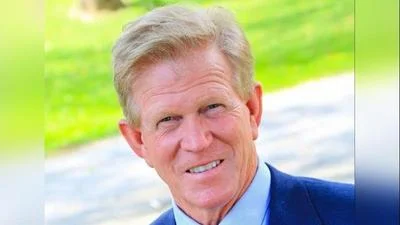Rep. Chris Miller (R-Robinson) | https://repcmiller.com
Rep. Chris Miller (R-Robinson) | https://repcmiller.com
State Rep. Chris Miller (R-Oakland) is raising concerns about public safety in the wake of the Illinois Supreme Court ruling reinstating the cashless bail policy enacted in the criminal justice reform bill known as the SAFE-T Act.
The law will now be enacted in mid-September positioning Illinois to become the first state in the U.S. to completely remove cash bail.
"As of July 18, Illinois has become the first state in the U.S. to completely abolish the system of cash bail, after the Democrat supermajority Illinois Supreme Court ruled 5-2 that the state’s controversial SAFE-T Act law does not violate the state constitution’s so-called 'bail clause,'" Miller said in a newsletter. “We’ve all seen countless stories in the news lately about violent criminals who are prematurely released from jail (if they were jailed at all) and who go on to commit additional heinous crimes. Illinois now needs to brace itself for the consequences of Governor Pritzker’s horribly misguided Democrat policies.”
According to him, “The pro-criminal SAFE-T Act is an irresponsible and dangerous piece of legislation that Illinois Democrats rammed through in the waning hours of the 101st General Assembly."
"This will put you, your family, and your community in danger, and I am very disappointed to see that the Illinois Supreme Court has ruled in favor of No Cash Bail,” Miller added. “The constitutionality of the ill-conceived SAFE-T Act was challenged in court by solid, pro-law enforcement legislators, attorneys, and police organizations. When social engineering in the criminal justice system trumps citizen safety and hamstrings law enforcement, chaos and destruction are guaranteed to follow.” “Not only do we need to push back against Governor Pritzker and his Democrat party, these reckless people need to be held accountable when the inevitability of their decisions bears bad fruit that harms us all.”
In the historic decision, on July 18, the Illinois Supreme Court overruled a lower court judge noting the provision of the SAFE-T Act, which ends cash bail, as constitutional. The 5-2 vote came after a six-month delay caused by legal challenges against the provision. Critics argued that the law restricts judges' discretion in detaining individuals. Courts across the state will have a two-month preparation period before the new bail rules take effect.
In Southern Illinois, sheriffs have begun warning their constituents they expect an uptick in crime when cashless bail is launched in September. Franklin County Sheriff Kyle Bacon and other sheriffs in southern Illinois are warning of anticipated increased crime rates and victimization following the Illinois Supreme Court's ruling to end cash bail, making Illinois the first state to fully abolish it; law enforcement expresses concerns over the potential consequences of the change and argues that it's an experiment on the backs of crime victims. In addition to ending cash bail, Democrats have passed legislation that restricts the ability to challenge unconstitutional laws, limiting challenges to Democrat-controlled courts in Chicago and Springfield, and raising concerns about the erosion of checks and balances in the state.
Meanwhile, in the wake of lower court rulings against the SAFE-T Act and the state’s expansive gun ban, Democrats passed legislation that restricts the ability to challenge unconstitutional laws, limiting challenges to Democrat-controlled courts in Chicago and Springfield and potentially hindering conservative opposition. The move is seen as an attempt to control which cases reach appeals courts and consolidate power in the hands of the Democratic majority, leading to concerns about eroding checks and balances in Illinois, Chicago City Wire reported.
Opponents have also called out Democrats for heavily donating to the campaigns of two of the justices who voted in favor of overturning a lower court’s ruling noting the Act’s unconstitutionality. Gov. J.B. Pritzker donated $2 million to two Illinois Supreme Court justices' campaigns, Mary O'Brien and Elizabeth Rochford, despite a law capping campaign contribution limits at $500,000. Both justices voted in favor of reinstating cashless bail in the SAFE-T Act, according to The Heartlander. Critics have expressed concerns about potential conflicts of interest and call for oversight and recusal to maintain public trust in the judicial system.
“If we don’t have confidence in the opinions the judicial branch issues then our judicial branch is failing,” Chris Forsyth with the nonpartisan Judicial Integrity Project told The Center Square. “Political donations can lead to issues of judicial integrity and the United States Supreme Court has said so. In some cases, they have found political donations to be so grave that there is a conflict of interest that is impermissible.”





 Alerts Sign-up
Alerts Sign-up